The changing role of Females Who Farm

Story sponsored by Tablelands Farming Systems.
Women have always made a strong contribution to the agricultural sector.
Henry Lawson immortalised the spirit of country women with his classic short story "The Drover's Wife", which chronicled the trials and tribulations of a mother who is left to look after her children and home while her husband is off working.
More than a century later, women play a larger role in farm management than ever before. Not only do they continue to be the backbones of their families but they're also integral parts of their overall businesses.
They're bookkeepers, financial managers, key decision makers, care for livestock, they're hands on in the paddock and - thanks to the ever increasing research into best practices and updated legislation - more often than not, they're the chief compliance officers too.
That's why Tablelands Farming Systems launched a local initiative called Females Who Farm Leadership Program.
It's a way for rural women to keep up to date with the latest information and changes within the sector, while sharing new ideas and information with one another.
The group received funding through the NSW Department of Community Services' Investing In Women Initiatives program in July last year.
Since then, members like Goulburn farmer Jan Stone say it has helped out massively with the running of their businesses.
The group holds regular meetings and will conduct a two day training course in Goulburn tomorrow, aimed at building time management, communication and negotiation skills.
It is the third course they've delivered this year. They also held a livestock handling course, to build confidence working with sheep and cattle in the yards, and a records management compliance course, that touched on changes to legislation including payroll and biosecurity, which has been a hot button issue in past few months.

Not only have the state and federal governments recently reformed legislation into the issue, redefining the responsibilities of producers, but the recent "farm invasions" by animal rights activists has also caused concerns over introduction of pests and diseases, especially if they're driving dirty vehicles or interfering with young animals.
That's why Females Who Farm are putting together a project and engaging with experts to help its members address the issue.
"We're trying to get our heads around what (the new legislation) means for farmers in particular and what our new responsibilities are," young mum and Gunning based wool producer Lucy Knight explained.
"Much of biosecurity is best practice farming, so for many of us it's just more of what we're doing. But, you also have to understand what your obligations are so you can prove that you are doing the right thing."
Mrs Stone knows all too well what can happen when biosecurity protocols are not followed. A couple of years ago, her and her husband purchased some cattle from an unscrupulous vendor.
Within days, one of the cattle came down with an infectious disease which spread through the rest of their herd. It took a lot of time and money to get the outbreak back under control.
She says people don't realise how quickly diseases, weeds and introduced pests can spread, that's why it is important to understand your responsibilities before entering a property.
"If you don't control disease and weeds you're really not going down the right path because these things do spread from farm to farm and they do cause a lot of trouble," she said.
"One of the main ways that weeds spread is on machinery. You'll get somebody in to do a job for you if their tractor or truck or whatever isn't clean and they're running them over your fields, they can spread seeds."

This is why the government has gone to the effort of defining the responsibilities of each party within the supply chain.
"Everyone is responsible for trying to minimise the spread of disease and domestic pests," Mrs Knight explained.
"So, farmers are now within their rights to ask anybody who comes onto their property - be they tractor operators or vets or contractors - to follow strict guidelines to ensure they're not bringing diseases or pests onto their farm," she continued.
"When trucks enter your property you have the right to expect them to be clean in the same way saleyards and feedlots have a right to expect animals to be healthy and treated before entering. It is everybody's responsibility and we're learning more about what the obligations are for each party."
Aside from access to latest research and upskilling, Females Who Farm also provides family support, including access to childcare if they need to attend an event.
It also provides a sense of community amongst its members and is helping to redefine the way we think about women on the land.
"It's really interesting because whenever you meet somebody and tell them you live on a farm they always say, 'Oh, so you're a farmer's wife'," Mrs Stone said.
"And of course the answer is 'No, I'm not,' to which they always say, 'Oh? Well what are you then?'... I'm a farmer..." She continued.
"I think women have traditionally done the paperwork, which many still do, but nowadays, many women are actually out in the paddock with the men doing the 'farm work'."

"Women often bring many skills with them from previous careers and I think Females Who Farm really taps into some of those," Mrs Knight added.
"It shows you how you can use those to your benefit within your farming business... Women in farming businesses fulfill a really wide and varied range of roles..." she went on.
"(From) managing staff and contract labour to overseeing compliance around health, safety and biosecurity. Many women are also the bookkeepers or the go between with accountant.
"They're involved with a lot of advocacy groups and lobbyists. They're scheduling meetings with council. They're the ones filing the paperwork to get drought assistance.
"On top of that, so many women are involved in the practical side of the business too. They doing the stock work, they're feeding animals, it goes on.
"And, it often fits in around their own careers, children, school commitments, aging parents, community commitments, it's a real juggling act.
"The support that Females Who Farm give them is providing some real confidence that they can take on some of these growing responsibilities with a little more capability as well as both the knowledge and support they require."
As a producer-owned organisation, Tablelands Farming Systems provides localised farming information and delivers training and workshops to improve the way farms operate.
Their members farm more than 240,000 sheep and 11,000 cattle across approx. 60,000 ha of the Southern Tablelands.
For more information about Tablelands Farming Systems or The Females Who Farm Leadership Program, please click here.
Story sponsored by Tablelands Farming Systems.


